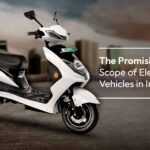With its rapidly growing population and urbanization, India is at the cusp of a transformative shift in its transportation landscape. Electric vehicles (EVs) are the talk of the town, and for good reason. EVs emerge as a beacon of hope as we navigate the intricate web of pollution, fuel costs, and sustainability challenges.
Picture a world where Indian cities are free from the cacophony of combustion engines. With their near-silent operation, electric vehicles, quite literally, promise a quieter, less polluted future. They are a breath of fresh air, producing zero tailpipe emissions. This is a game-changer in a country grappling with alarming air quality levels. EVs symbolize a tangible step towards cleaner, healthier cities, where smoggy skies will be a thing of the past.
EVs elevate the driving experience, thanks to the underlying cutting-edge technology that’s powering them. Electric vehicles offer a seamless ride, offering you the best riding experience. Charging infrastructure is evolving rapidly, with charging stations becoming more accessible, making EV ownership increasingly convenient.
In this guide, you’ll find a wealth of knowledge about electric vehicles in India. So, fasten your seatbelt and join us on this electrifying journey as we explore the myriad benefits of buying electric vehicles in India. It’s a road paved with sustainability, savings, and innovation, beckoning you to be a part of the transformation.
Benefits of Buying an EV in India
The benefits of buying an electric vehicle in India are numerous. Electric vehicles offer a compelling proposition, from reduced operational expenses and minimal maintenance costs to eliminating tailpipe emissions and enjoying tax incentives.
Here we take a look at some of the exclusive benefits offered by EVs:
1. Reduced operational expenses
Owning an electric vehicle in India brings significant cost savings compared to traditional petrol or diesel cars. Electric vehicles have lower operational expenses, particularly fuel costs, because electricity is cheaper than fossil fuels. Charging an EV is generally cheaper than refueling a conventional vehicle, resulting in substantial savings on fuel costs over time.
2. Minimal maintenance expenditure
Electric vehicles have fewer moving components than Internal Combustion Engine (ICE) vehicles. This cuts maintenance costs. With no engine oil to change, no spark plugs to replace, and no transmission system to maintain, EV owners can enjoy reduced maintenance expenses.
3. Elimination of tailpipe emissions
One of the most impactful benefits of electric vehicles is their contribution to reducing air pollution. Unlike conventional vehicles, EVs produce zero tailpipe emissions. By driving an electric vehicle, you actively help improve air quality and reduce the release of harmful greenhouse gases, helping mitigate the effects of climate change.
4. Effortless and noise-free driving
Electric vehicles offer a smooth and quiet driving experience. With their electric motors, EVs provide instant torque and acceleration, making them fun and effortless to drive. Additionally, the absence of engine noise creates a serene and peaceful driving environment, enhancing the overall driving experience.
5. At-home charging convenience
Charging an electric vehicle can be done conveniently at home. By installing a charging station or using a regular power outlet, EV owners can recharge their vehicles overnight, ensuring a full battery for the next day’s commute. This eliminates the need for frequent visits to fuel stations and provides the convenience of charging your vehicle at your residence.
6. Absence of disruptive noise pollution
Electric vehicles contribute to a quieter and more peaceful urban environment. Unlike traditional vehicles, EVs operate silently, reducing noise pollution in cities and residential areas. This absence of noise pollution benefits EV owners and enhances the overall quality of life for communities.
7. Tax incentives and financial advantages
The Indian government has implemented various tax incentives and financial advantages to promote the adoption of electric vehicles. These incentives include reduced GST rates, lower road tax, and subsidies on the purchase price of EVs. By taking advantage of these measures, EV owners can enjoy significant cost savings and make electric vehicles more affordable.
Related Blog: Electric Scooter vs Petrol Scooter – Which One to Choose?
Conclusion
Electric vehicles produce zero tailpipe emissions, meaning they do not release harmful pollutants into the atmosphere, improving the overall air quality and public health. Furthermore, choosing electric vehicles give individuals practical advantages that enhance their daily lives. With reduced operational expenses and lower maintenance costs, EV owners experience long-term financial benefits. The lower cost of electricity compared to fossil fuels translates into significant savings on fuel expenses. Moreover, the simplified maintenance requirements of electric vehicles mean less time and money spent on servicing and repairs.
Electric vehicles can help India achieve a greener and more sustainable future, while also providing individuals with practical advantages, such as lower operating and maintenance costs, and a more enjoyable driving experience. It is a win-win situation, benefiting both the environment and the individuals who choose to adopt electric vehicles as their mode of transportation.
We at iVOOMi are committed to adding value to the consumer’s daily life. iVOOMi has been manufacturing EVs that are setting new benchmarks since 2019. We believe the future of mobility will be electric. We are creating it here in India for the world. We proudly proclaim it as “BADALTE BHARAT KA NAYA CHEHRA.”


